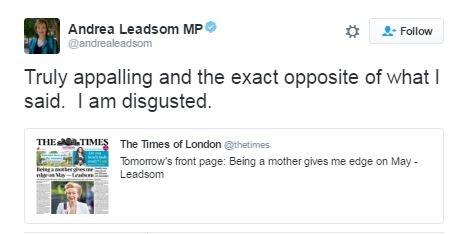When we speak to the delegates at the start of our media training courses we often find they have a fear of being misquoted by a journalist.
This trepidation may be fuelled by a lack of media experience and a perhaps understandable fear of negative headlines.
But it may also be driven the number of celebrities and politicians who regularly claim they have been misquoted when they see an article they feel does not portray them positively.
The most recent example of this involved Conservative MP Andrea Leadsom and The Times over the weekend. And the fall out was very public and dramatic.
The newspaper reported that Ms Leadsom had suggested being a mother made her a better choice for Prime Minister than Theresa May.
This prompted an angry response from Ms Leadsom who labelled the article ‘appalling’ on Twitter and claimed it was the ‘exact opposite’ of what she had said.

However, The Times later released a transcript of the interview and published the audio on its website. Ms Leadsom subsequently apologised but claimed in a subsequent interview she had been ‘pressured’ to say how her children had formed her views.
Such was the high profile nature of the dispute it became known as ‘Mothergate’ and turned into its own crisis communications situation.
If your organisation’s spokesperson feels they have been misquoted getting involved in a public row with reporter and the publication is probably not the best way to handle the issue however angry they feel. If anything it will only add to the story and if the reporter has a recording of the conversation they are on shaky ground.
'If you feel you've been misquoted, having a public row with the newspaper isn't the best way to handle the issue' via@mediafirstltd
Instead, if you feel they have been misquoted and that it damages their reputation or the business, contact the publication and make a suggestion on how it can be fixed, such as print and online corrections. The key is to stay calm and polite.
If the ‘misquote’ is unlikely to cause any significant harm then simply let it go.
Of course the best option is to reduce your chances of being misquoted or misunderstood in the first place and here are nine ways we think you can make that happen:
1. It sounds simple, but speaking more slowly is crucial. The faster you speak the harder it is for a reporter to accurately record what you are saying either by shorthand or typing it straight into the computer.
2. Watch and listen. If you can see a reporter is struggling to keep up with their notes or can hear them typing furiously on the phone follow the tip above.
3. Don’t ramble. The more long winded your answers are the harder it is for a reporter to follow and that creates more potential for mistakes, confusions and misinterpretation. Case studies will support your point and help ensure you are not misinterpreted. Good body language and tone of voice are also important here.
4. Avoid jargon. Journalists hate jargon – and so do their readers for that matter. It makes quotes unusable and can mean different things to different people, causing confusion and a lack of clarity.
5. Prepare thoroughly. Make sure you know what you want to talk about and what issues you think will be raised by the journalist and know how you will respond to them clearly and concisely.
6. Don’t speculate. Journalists are obsessed with the future and love to speculate about it. They will invite you to do the same with questions such as ‘what would happen if…’. This is risky ground for the interviewee and could see them commenting on a subject they are poorly prepared for. Avoid.
7. Don’t repeat negative language. Journalists will sometimes use negative phrases in their questions and very often the interviewee repeats the negative language, even when they are defending themselves and rebutting the accusation. For example, the reporter may say: “This is very disappointing isn’t it? Aren’t you disappointed?” And the interviewee could answer: “I wouldn’t say it is disappointing….”But they just have. The journalist’s negative language can now be attributed to you. Whether it is broadcast or press, they have a sound bite with your using the negative phrase.
8. Don’t go ‘off the record’. This is an area fraught with danger for the interviewee as the term means different things to different people. It has no legal significance and is purely a matter of trust between you and the reporter. Assume that everything you say to a journalist can and will be attributed to you.
9. Don’t get too comfortable. Try and remain calm and relaxed but never go in auto-pilot and not probably consider what you are saying. Or you can begin to view the journalists as a friend and overshare. This is a particular risk in a feature interview where you will inevitably spend more time with the reporter.
Media First are media and communications training specialists with over 30 years of experience. We have a team of trainers, each with decades of experience working as journalists, presenters, communications coaches and media trainers.
Click here to find out more about our highly practical media training, crisis communication and presentation skills training courses.
Subscribe here to be among the first to receive our blogs.


